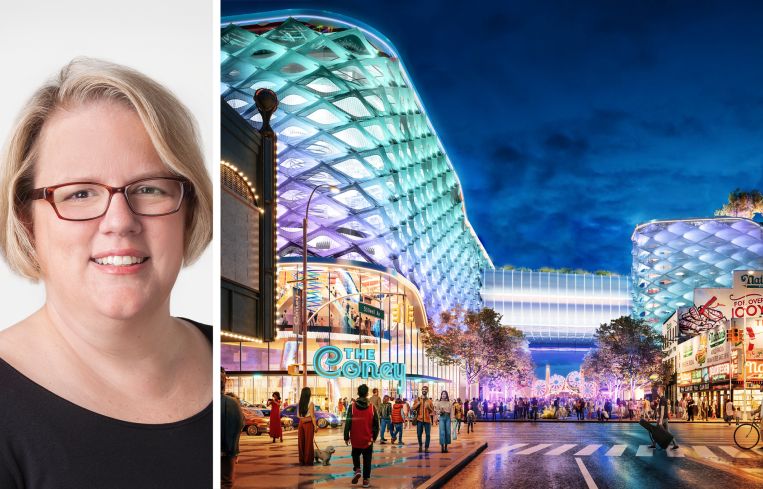Team Behind Proposed Coney Island Casino to Oversight Panel: Hear Us Out
Fearing a rejection on Monday, Thor Equities is trying to set the record straight about what The Coney can do for the community
By Mark Hallum September 26, 2025 12:39 pm
reprints
The developers behind The Coney are sweetening the pot by offering more community investment ahead of a key committee vote on the proposed Brooklyn casino.
Community Advisory Committees (CAC) — tasked with reviewing the eight bids for three downstate gaming licenses — rejected all three Manhattan casino proposals in the past 10 days, while voting in favor of expansions for two racinos, one in Queens and the other in Yonkers. Reading the tea leaves, Thor Equities is looking to change the minds of three CAC members who are actively opposed to Thor’s Coney Island application.
Thor is increasing the size of the community trust it will create if awarded a license to $300 million and its public safety fund to a total of $100 million while offering CAC members the opportunity to have full command of how the funding would be deployed.
The previous commitment had been a $200 million community trust fund and $75 million in local public safety initiatives.
That would be on top of the $10 million investment by the casino partners in a local ferry stop, and $5 million for local food pantries, according to Thor, which also agreed to raise its local hiring commitment from 9 percent to 30 percent
Melissa Gliatta, global chief operating officer of Thor, noted that CAC members such as Brooklyn Borough President Antonio Reynoso, Councilmember Justin Brannan and state Sen. Jessica Scarcella-Spanton’s voicing opposition prior to the vote itself presented an opportunity not afforded to other proposals. But it was concerning nonetheless, she said.
“This is a really amazing time to hopefully try to get more communication out there, [but] we’re just puzzled by why the CAC walked away from the negotiating table so early, and you almost wonder if all the communication is getting to them,” Gliatta told Commercial Observer. “The state senator put out in her statement saying that she couldn’t support The Coney’s 9 percent commitment to local hiring, but it’s really 30 percent, so we’re kind of out here scratching our heads.”
On Monday, Brannan penned an op-ed in the Brooklyn Paper simply stating that a casino would be a bad fit for the community despite the economic hardship and lack of investment apparent in the oceanfront destination neighborhood. Instead, Brannan said there should be more wholesome family entertainment similar in nature to the existing amusement parks, which suffered during the pandemic and which depend on seasonal visitations.
Reynoso took to Instagram the same day with a statement calling the proposal “deeply unimpressive and unresponsive to the needs” of Coney Island residents while failing “to prove itself as a public good.”
“Over the last few years since The Coney presented their proposal to the community, there have been many opportunities to fully demonstrate their investments into Coney Island,” Scarcella-Spanton said in a statement to CO. “From what the applicants included, and despite the recent amendments to their application, I have had hundreds of conversations with my constituents on what they want and need in Coney Island, and these investments do not make this location more suitable for the proposed casino.”
Representatives for Brannan and Reynoso did not respond to requests for comment.
The $3.4 billion project aims to develop across four vacant blocks near the boardwalk in the People’s Playground. The Thor-led team behind the proposal argues that the expanse is devoid of foot traffic as soon as the summer season winds down, something that can be avoided if there were a three-floor casino, a 500-room hotel and a convention center.
The Coney would diversify Coney Island’s economic opportunities, in other words, according to Thor, which has partnered with Saratoga Casino Holdings, the Chickasaw Nation and Legends as operators.
The project also includes a 2,500-seat concert venue, 70,000 square feet of retail and 90,000 square feet of meeting and event space.
On Thursday, CACs approved proposals for Resorts World New York City, which will lose its horse racing track to consolidation with Belmont Park, as well as MGM Empire City, making them the only two applicants that have made it through the community engagement process so far.
In recent weeks, CACs have rejected Caesars Palace Times Square, spearheaded by SL Green Realty; The Avenir on the Far West Side led by Silverstein Properties; and Soloviev Group’s Freedom Plaza near the United Nations.
Other than The Coney, the remaining applicants hoping to pass the gauntlet include Bally’s proposal in the Bronx and the Metropolitan Park proposal by New York Mets owner Steve Cohen and Hard Rock Entertainment in Willets Point, Queens.
The latter two will be voted upon on Sept. 29 and Sept. 30, respectively.
Only proposals approved by a CAC can advance to the full approval stage by the New York State Gaming Commission in December.
Mark Hallum can be reached at mhallum@commercialobserver.com.



